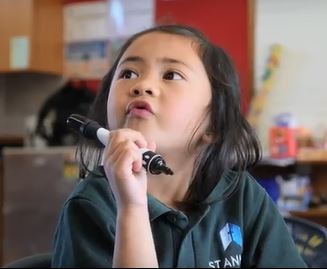Give your child a great start in reading and writing
By Professor Gail Gillon
This week parents and caregivers of more than 63,000 children will be sending their child to school for the first time. Throughout New Zealand, they will wave good-bye as their little person walk through the gates of one of the first major milestones in their life.
It’s a time of mixed feelings. Parents want to know their children will be ok, that they will make friends, that their teachers will be kind and wise. They know that if their child enjoys this first year, the first steps on the journey of learning will be clear and confident. For the children, the first days at school will be a mix of chaos, wonder and excitement. For the sake of both parents and children, the main hope is for an easy transition into a new stage in life and learning.
Perhaps the biggest part of starting school for Year 1 children are the initial steps taken to learn to read. Yet learning to read and write is not always easy. It’s a complex process but through research we know what helps to make this a successful experience for children. The latest international data drawing from reading assessments of children from 50 countries around the world, including New Zealand (PIRLS, 2016*) shows that good readers at the age of 10 had a positive early start and had homes that supported literacy.
One of the key research programmes at A Better Start National Science Challenge is investigating the best ways to lift the number of children who have a good start to early literacy and successful learning. The research investment is necessary because a significant proportion of our children fall behind in their reading and writing from Year 1.
It makes no kind of sense to wait for that to happen but we also want to be sure that learning to read and writer is guided by research that if put into practice, will improve learning for all of our children. It does not take a researcher to know that prevention is far more effective than seeking a later cure. The good news is that as a parent there are many, easy things you can do to start your child on the path of successful learning in their reading and writing.
Make if fun: Reading with your child or listening to your child read should be a fun and rewarding experience – give plenty of praise and encouragement for your child’s reading attempts. Tell your child how clever he or she is in learning to read and write.
Practice: Like any new skill the more you practice the easier it gets. Find lots of opportunities to read with your child and for your child to read to you (not only at bedtime). Encourage your child’s early writing attempts as often as you can.
Crack the ‘written code’: How well a child grows their ability to “work out the written code” is a powerful way to predict early reading success. What this means is that children need to understand that the letters on a page are related to sounds in words. The child needs to learn that words can be broken down into sounds and then blended together to form words (we call this phonological awareness – or awareness of the sound structure of words). You can help children develop this skill by highlighting the link between letters and sounds on a page. For example, sit with your child and work through sentences and sounds. So in a sentence like “This story is about a boy called Sam.” look together at Sam’s name. Point to the letter S and explain how it starts with the letter S. Then make the sound of the letter: “The letter S makes a “ss” sound, it says Sam.”
Explain unfamiliar words: Sharing story books together is a great way to extend your child’s vocabulary so they comprehend more complex stories. Talk about some of the interesting words in the story book. Break up longer words into syllables (or parts) and listen to the sounds in the words and talk about what the words mean.
Encourage your child to retell the story: Once you have read a story together, or a child has read a little story book to you, talk about what happened in the story. If it is a favourite story or a story that has something exciting happen in it, encourage your child to retell the story to someone else in the family. This helps develop your child’s understanding and knowledge of story structure (e.g. a story has a beginning, middle, and an end) and supports your child’s oral language development.
A healthy child equals healthy education: Your child’s health can affect their learning. Check your child can hear and see well, is eating and sleeping well, and gets regular exercise. A healthy child learns better.
Learning to read and write takes time and effort- young children will find it tiring. As parents be patient and praise the efforts your child makes. Ensuring your child learns to read and write well is a team job. Talk with your child’s teacher about ways you can help your child practice their reading and writing at home. Listening to your child read a favourite book or reading a little story they have written are some of the great joys of being a parent. Enjoy your child’s learning as they begin to experience the great riches that becoming literate offers.
+ Professor Gail Gillon is the Co-Director of the A Better Start National Science and Pro-Vice Chancellor of Education, Health and Human Development at the University of Canterbury.

